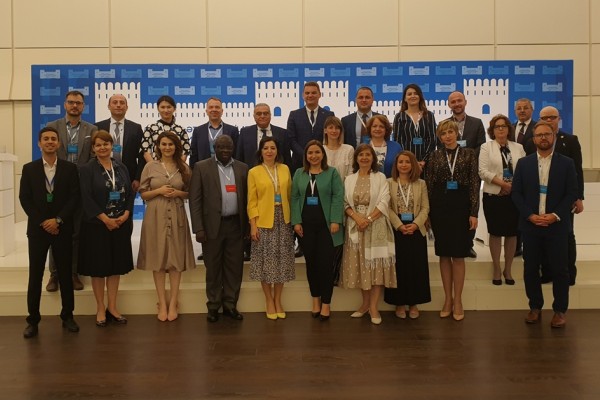
ReSPA traditionally participates at the UNDESA Awards ceremony
Regional School of Public Administration (ReSPA) participated at the 2019 United Nations Public Service Forum (UNPSF) in Baku in the Republic of Azerbaijan from 24 to 26 June 2019, under the theme “Achieving the Sustainable Development Goals through effective Delivery of Services, Innovative Transformation and Accountable Institutions”. More than 450 delegates from all UN members states have taken part in this global event.
ReSPA contributed to the event by oranising the panel Developing effective and accountable public institutions. The main discussion lead to the answering of the following questions: “Are the conventional anti-corruption approaches still valid? What have we learned from the Fourth Industrial revolution and how can we harness its opportunities to defeat corruption and improve public administration?”.
Even though designed in 2014, Abuse of IT for Corruption ReSPA publication received a lot of attention once being presented. The interest has been shown, in particulary, to the ReSPA self-assessment toolkit, called IT Checklist, which was developed to identify vulnerable places in the IT system for corruption.
Improving service delivery through Quality Management was a topic of the ReSPA panel within the UNDESA forum (United Nations Department of Economic and Social Affairs) which gathered the speakers from the Western Balkans (Albania, Bosnia and Herzegovina, Montenegro, North Macedonia and Serbia), Georgia and Azerbaijan.
The event was opened by the inspiring speech of Ms. Pribilovic, Minister of Public Administration of Montenegro, followed by Ms Ratka Sekulovic, ReSPA Director. Ms Sekulovic elaborated how ReSPA, through the mechanism of direct support, contributes to the Western Balkan Administrations in improving public services with the special emphasis on digitalization of services, quality management and leadership.
Numerous inspiring cases presented on the panel opened up discussion underlining the role of technological change in the public sector through digitalization. Furthermore, the cases showed how public institutions can develop and institutionalize adjustable, transformational and collaborative leadership. One of the genuine conclusions was that the solutions for contemporary Public administrations and public services must be flexible and customer centric, strengthened by Quality management instruments, new IT technologies and Agile Management.



